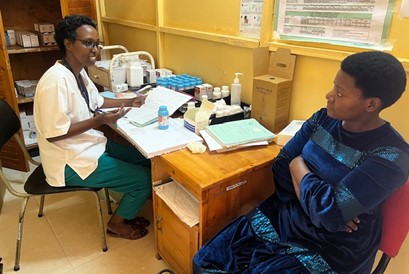Rwanda Benchmarks Use of Antibiotics to Curb Antimicrobial Resistance
Resistance to antibiotics is an increasingly concerning health issue in Rwanda. Studies conducted at Rwandan university teaching hospitals found a high prevalence of antimicrobial resistance (AMR) in some of the antibiotics commonly used to treat infectious diseases, threatening the successful treatment of patients. A major contributor to AMR is the overuse and misuse of antibiotics by clinicians.

A health care provider dispenses medicines at a health center. Photo Credit: USAID MTaPS Rwanda
Rwanda’s national essential medicines list (NEML) for adults and children, which guides the use of medicines, was last updated in 2015 and did not reflect the most recent World Health Organization (WHO) guidance. In collaboration with USAID MTaPS, the Rwandan Ministry of Health (MOH) revised the NEML, incorporating WHO’s Access, Watch, and Reserve (AWaRe) antibiotic classification—a tool that supports antibiotic stewardship efforts. This significant step aims to optimize the use of antimicrobials and preserve their efficacy in treating diseases.
Adopting AWaRe: A Strategy to Combat AMR
Rwanda developed its first national action plan on AMR using the One Health approach, which focuses on multisectoral efforts and is globally recognized as vital to fighting AMR. As part of the approach to optimize the use of antibiotics, MTaPS partnered with WHO to assist the MOH in updating the NEML to align with the AWaRe categorization and standard treatment guidelines for prevailing health conditions. The overall goal of AWaRe is to monitor and reduce or increase the use of different classes of antibiotics as appropriate.
Categorization Methodology
MTaPS assisted with data collection on the local epidemiology of infectious diseases and conducted an extensive desk review of regional and international literature on infectious disease profiles in Rwanda. The resulting list was supplemented with key informant interviews and a workshop with national infectious diseases experts to build consensus. As a final step, MTaPS facilitated peer-review consultations with long-serving national health care providers to review and validate the final list as the first Rwanda AWaRe classification of antibiotics.
Way Forward
The revised 2021 NEML, which will guide prescribing going forward, includes 42 antibiotics. Adopting the AWaRe classification as part of its national AMR action plan is helping Rwanda benchmark the use of antibiotics in the country—a strategy that promotes more responsible prescribing and rational use of antibiotics and is key to curbing AMR and improving patient safety.
“The AWaRe classification is an opportunity for the health sector to set targets for measuring and reporting progress on antibiotic use. The overall goal is to increase the use of access group antibiotics where availability is low, while at the same time reducing the use of watch group and reserve group antibiotics that are at higher risk of antimicrobial resistance” —Dr. Corneille Ntihabose, Head of Department, Clinical Services, MOH
The classification also guides clinicians on which antibiotics to use for specific syndromes, improving therapeutic results in patients and overall patient safety and contributing to controlling AMR.